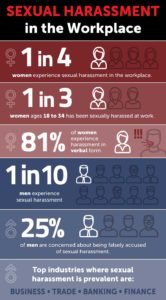Sexual Harassment
Every employee has the right to a harassment-free work environment. Workplace sexual harassment is prohibited on both a federal and state level by the Civil Rights Act of 1964 and the New Jersey Law Against Discrimination, as well as state criminal codes. The Equal Employment Opportunity Commission’s (EEOC) definition of sexual harassment encompasses any unwanted sexual advances, requests for sexual favors, and other behavior of a sexual nature that interferes with an employee’s work performance, implicitly or explicitly impacts employment decisions, or creates a hostile work environment.
At Sidney L. Gold & Associates, P.C., our employment lawyers know that no one should be forced to tolerate this behavior in the workplace. We want workers to understand their rights when it comes to sexual harassment and will investigate every case thoroughly to help you recover from what was a terrible ordeal. Contact us if are experiencing sexual harassment or you feel uncomfortable going to work in a hostile environment.
 Recognizing Sexual Harassment
Recognizing Sexual Harassment
Sexual harassment can take many forms and can be experienced by employees of either gender. An employee may be harassed by their supervisor, a manager from another department, a co-worker, an outside contractor, or even a non-employee on the workplace premises. A sexual harassment victim can be anyone adversely affected by the offensive behavior, even if the behavior was not directed specifically toward them.
Offensive behavior can include:
- Lewd remarks, nicknames, or insults
- Sexual propositions impacting your employment
- Unwanted sexual or romantic attention
- Leering, whistling, or suggestive gestures
- Displaying or sending pornographic or sexual content
- Unwelcome contact during the workday
- Coerced sexual acts that directly impact your employment
Sexual harassment complaints typically fall into one of two categories. The first is quid pro quo, which occurs when a supervisor implicitly or explicitly communicates that a worker’s employment status, pay, promotion, or other employment benefits are contingent on the exchange of sexual favors. The supervisor is essentially threatening the employee with adverse employment consequences, such as a poor review, demotion, or termination if the employee does not engage in a sexual relationship.
The second is a hostile work environment that makes the employee feel uncomfortable. Even if the sexual harassment is not aimed at you specifically, you may feel uncomfortable going to work knowing that your colleagues or superiors will continue to sexually harass you or your co-workers, whether it be in the open or behind closed doors.
Quid Pro Quo
Quid pro quo complaints can only be made if the harasser is a boss or manager who has authority over the employee’s employment conditions. If the harasser is a co-worker who cannot implement change to the victim’s pay rate or employment status, he or she may be creating a hostile work environment, but it would not be considered quid pro quo.
Quid pro quo often occurs in the office, but it may also occur outside the office. You may be on a work trip with your supervisor the first time they suggest that sexual favors to keep your job, or to receive a promotion or the training you need. The same thing could happen at a work luncheon/dinner, or you may be approached by a supervisor outside the office in a non-work-related capacity. If your supervisor is wielding their authority to gain sexual attention or favors, they are committing quid pro quo.
You may be aware of an exciting work opportunity within the company, but you need to contact another supervisor to transfer or apply for the promotion. If the supervisor in that department suggests that you trade sexual favors for a promotion or uses lewd remarks during your initial meetings, you can report that person for sexual harassment, even though you do not work directly under them.
What is a Hostile Work Environment?
 A hostile work environment is the second type of sexual harassment complaint. When an employee is subjected to sexual, abusive, or offensive behavior because of his or her gender, this is a form of discrimination and a violation of federal and state law. A hostile work environment can occur anywhere, no matter how minor the harassment is perceived to be.
A hostile work environment is the second type of sexual harassment complaint. When an employee is subjected to sexual, abusive, or offensive behavior because of his or her gender, this is a form of discrimination and a violation of federal and state law. A hostile work environment can occur anywhere, no matter how minor the harassment is perceived to be.
Offensive behavior can be verbal or physical and does not need to be directed at a particular employee. If the behavior is severe enough to change or alter the working conditions for employees of a certain gender, or in any way interferes with an employee’s ability to perform work functions, that behavior is considered unlawful. Employers have a responsibility to stop this behavior when it occurs, and an employee can file a hostile work environment complaint if they fail to do so.
Certain sexual harassment claims start small with text or emails that include lewd or suggestive content. You should save these messages and report the harassment at once. If you work for someone who sends suggestive or pornographic emails or texts to your co-workers, you can report the harassment if it makes you uncomfortable. Your co-workers may not want to file a complaint, but the hostile work environment in the office includes how you feel knowing your supervisor behaves in this way toward your colleagues.
A hostile work environment may not involve sexual harassment that targets you. You may feel deeply uncomfortable going to work because you know how certain people are treated. You may, in fact, believe that you will be next. In some cases, you may have been told that you will be next. This level of discomfort constitutes a hostile work environment that should not be tolerated. If you are hoping to be promoted or work on a team that allows you to make more money or receive more benefits, you may be afraid to take the position due to the harassment that occurs in that department. You can report your fears, and your employer must open an investigation immediately.
A contractor that works with your company might use lewd remarks or gestures when they come to the office. They might send you suggestive messages, or they might initiate unwanted contact while they are in your office. Even though this person does not work for your company, they still create a hostile work environment when they are there. The same could be true if that contractor has tried to solicit you outside the office.
A hostile work environment also includes any insinuation that you should not report sexual harassment claims because you will not be believed. You may work with people who give you what they believe to be friendly advice because they fear retaliation if you speak up. Contact our employment lawyers at once if you have been discouraged from filing a complaint.
 How Do We Investigate Sexual Harassment?
How Do We Investigate Sexual Harassment?
When investigating claims of hostile work environment, the EEOC considers a number of factors, including:
- The nature of the harassment
- How often the harassment occurred
- How management responded to the harassment
- Any documented harassment
- Witness interviews
Each situation is unique and must be considered from the perspective of a reasonable person in the victim’s position. An employee does not need to suffer any negative employment consequences, such as termination or demotion, in order to bring a sexual harassment claim. You are protected from retaliation in the workplace if you file a sexual harassment complaint against another employee.
Document all instances of sexual harassment as best you can. If you have colleagues who witnessed the harassment, ask them to speak on your behalf. Your employer has a duty to open an unbiased investigation into your complaint, and that investigation should include an interview that in no way shames you for the harassment or how it makes you feel. Employers may want you to admit that the harassment was a misunderstanding, or they may tell you that is how the industry works. You do not need to continue with such an interview, and you can reach out to us for help. Provide any documentation you have of the harassment when you contact our office.
Your supervisor cannot write off any sexual harassment claims because they do not believe them, and you have every right to take your complaint up the chain of command, if necessary. Your conversations should be kept confidential. If your conversations with human resources were not kept confidential, you may be subjected to an even more hostile work environment. If your employer cannot guarantee your confidentiality, reach out to us. We will represent you and any of your colleagues if they experienced retaliation when reporting sexual harassment.
Cherry Hill Employment Lawyers at Sidney L. Gold & Associates, P.C. Advocate for Workplace Sexual Harassment Victims
If you were the victim of workplace sexual harassment, reach out to our Cherry Hill employment lawyers at Sidney L. Gold & Associates, P.C. We will thoroughly review the facts of your case and determine your legal options. Call us today at 215-569-1999 or contact us online for a free consultation. Located in Pennsauken, New Jersey, we proudly serve clients throughout South Jersey, including Cherry Hill, Haddonfield, Marlton, Moorestown, and Mount Laurel.





























